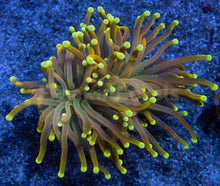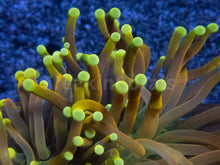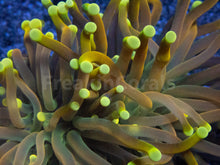🌟💛 Golden Sunburst Double Head Torch Coral
Euphyllia glabrescens
Quick Stats
-
Care Level: Moderate
-
Temperament: Aggressive
-
Colour Form: Gold Tentacles with Bright Yellow Tips, Double Headed
-
Water Conditions: 24-27°C, dKH 8-11, pH 8.0-8.4, sg 1.024-1.026
-
Family: Euphylliidae
-
Lighting: Moderate to High
-
Supplements: Calcium, Magnesium, Amino Acids, Trace Elements
-
Water Flow: Moderate to Chaotic
-
Placement: Bottom to Mid-Level
Overview
The Golden Sunburst Double Head Torch Coral is a crown jewel among Euphyllia glabrescens—its dual heads reach for the light, with rich golden tentacles glowing against vivid yellow tips. This torch coral is the epitome of reef royalty, offering a bold, colorful presence that commands attention without overwhelming the aquascape.
The gold-and-yellow coloration gives it a warm, almost sun-kissed glow under proper lighting, and with two heads, it’s not just a coral—it’s a living showpiece. Ideal for the discerning reef keeper looking to showcase a unique and eye-catching torch in their tank, it stands out whether in a minimalist aquascape or a larger mixed coral garden.
Care & Feeding
The Golden Sunburst thrives under stable water conditions and moderate to high lighting. Like other Euphyllia, it is photosynthetic but will benefit from regular feeding of planktonic foods, fine meaty foods, or coral-specific blends such as reef roids. This encourages optimal growth, full polyp extension, and maximum color vibrancy.
As with all torch corals, its long-reaching tentacles are capable of stinging nearby corals, so be sure to give it ample space to spread and grow.
Optimal Parameters
-
Alkalinity (dKH): 8-11
-
Calcium (Ca): 420-460 ppm
-
Magnesium (Mg): 1300-1400 ppm
-
Nitrate (NO3): 2-10 ppm
-
Phosphate (PO4): 0.01-0.05 ppm
Placement
Place the Golden Sunburst Double Head Torch in a spot where it has plenty of space—preferably at the bottom to mid-level of your tank with moderate to gentle flow. Ensure no direct current hits it directly, and keep it away from aggressive corals. The two heads will extend significantly, and they need room to thrive without causing stress to neighboring coral colonies.






